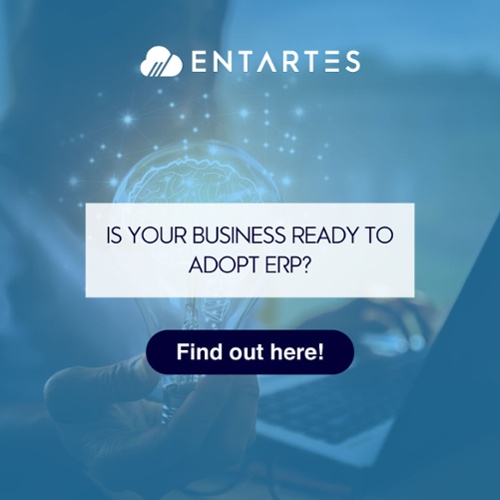Finding a new ERP is never a simple task, but it's an opportunity for growth and change. Selecting...
10 Signs That Your Small Business Needs An ERP Solution
It’s understandable: investing in ERP is a big decision both for strategy and budget. And it applies to first-time ERP purchases as well as changing outdated systems.
Making this decision is especially testing for small and medium businesses (SMBs), for whom every penny counts at the beginning.It is a typical reaction to a common myth surrounding ERP implementation: it’s too expensive or just for big companies. As a technology integration consultant, I’ve heard it time and time again, and so has renowned enterprise applications consultant Cindy Jutras.
Cindy has written extensively about how small is an advantage when implementing technology solutions for managing a business. In this blog, I go over her “case” for SMBs to commit to an ERP system. I also summarize key points about why your small business should take the plunge.
It is common for SMBs to wait until the last minute to implement software to run the business. It usually happens when management gets out of control, or the company plans to grow. Sound familiar?
I’ve seen it many times over as a technology integration consultant. And it’s not optimal. In the end, small businesses do it because they feel forced to it, not because they want to.
Yet preparedness is critical, especially for small companies. Something that global tech expert Cindy Jutras is adamant about as well.
Let me tell you more about Cindy. She is a champion of digital transformation in small businesses. Learn more about her experience in this profile on CIO magazine. And to her, size does not matter when implementing ERP.
Yet, it is the argument that small companies commonly use. They think it’s too expensive, or it’s a “big company thing.”
Actually, the annual Enterprise Solution Studies developed by Cindy’s consultancy firm, Mint Jutras, show that some SMBs think they are “saving money” by not investing in ERP.
Also, these surveys indicate that the software is not the issue. The myths surrounding ERP implementation costs and processes are what prevent these companies from making the right choice.
In her research, Cindy has come across different arguments that small businesses use to justify not investing in ERP. The most common are:
-
The capital is short.
-
Back-office solutions are a luxury.
-
Everything is already in spreadsheets.
-
Experience is better for decision-making.
-
There are applications for different processes already running.
Besides the fact that they are leaving money on the table by settling for something less than specialized software, these arguments signal that many SMBs still run on dispersed technology or outdated or broken manual systems.
Signs That Your Small Business Needs An Integrated Business Management Solution
This reasoning takes me to Cindy’s key signs that prove that a small company is in serious need of an ERP solution, which she goes over in much more depth in her blog.
I’ve summarized them in this list, which I took from her article “Think you are too small for ERP? Think Again, a read I highly recommend for all SMBs who are still mulling updating their management systems.
How Are You Running Your Business Today? |
What Is Wrong With It? |
What Do You Need? |
1. The current management solution is not easy to use. |
It could be hiding many other performance issues and could even negatively impact your ability to attract and retain talent. |
A solution that brings visibility to productivity or efficiency issues. |
2. Processes are manual; data is scattered in file cabinets, offline spreadsheets, and across desktops. Information is transferred between desks many times, adding little value and risking errors. |
You’re not in control. Your so-called solutions are costing you efficiency and productivity and limiting you in scaling your business. They are preventing you from growing. |
A management solution that gives you a distinct competitive advantage in today’s digital world AND that’s easy to use. More control and visibility into the data needed for effective time management and data-driven decision-making |
3. You spend more time searching for data than you can afford. |
You’re operating blind, not knowing where or when a crisis might develop. |
You need data at your fingertips and better time management. |
4. You are growing. You want to continue to add new geographies and new market segments. |
You’ve no idea how and where to expand. You have no visibility as to where you made your best profit. |
A solution that enables change and provides ongoing savings that help you sustain and grow your business. |
5. Your inventory levels are rising, yet you still can’t seem to meet customer requested ship dates. |
You can’t meet customer demand. You compete with something less than a complete and integrated solution. |
Better forecast demand. Lean out your inventory and produce products just in or ahead of time. |
6. Your team often turns to spreadsheets, paper, and manual processes to fill in the gaps when managing tasks. |
Frustration rises as your team struggles without the applications necessary to run the business. |
A solution that eliminates those routine and repeatable tasks so your people can focus on adding value to your business. |
7. Your office manager also manages your payroll and administers benefits. |
There’s no backup if this person is injured, ill, or takes an extended leave of absence. |
100% error-free resources management. |
8. You have no IT staff. |
Technology is leaving you behind. |
A solution for your business to operate at the speed of the Internet. |
9. Cash flow is tight. |
You can’t keep a close eye on cash and liquidity. |
To have visibility on your finances, supply chain costs, or growth investments. |
10. You are building your brand. |
Your business is not digitally prepared to compete. |
Communicate, collaborate, and conduct business at high speed and with a high level of transparency. |
Making an informed decision
If any of these signs seem familiar, you must ask yourself if your small business can afford not to implement a modern ERP software solution.
To make it easy for SMBs to realize that they should not wait to take this decision, she recommends SMBs to answer the following questions:
-
Are you in control?
-
Are you focused entirely on running your business?
-
Are all the areas in your organization supported?
-
Is your current solution complete?
-
Are you managing against realistic and achievable goals?
-
Can you afford ERP?
Because of the nature of small enterprises, the money will be an issue. But the point here is that it should not be the only factor to assess when deciding on upgrading your business management with technology.
Just like your large counterparts, you need to integrate all the components required to operate: resources, processes, and everything in between. Instead of stitching it all together with dispersing, broken or outdated solutions, a complete ERP is convenient.
What are your alternatives if you are short on capital?
Your ERP options have evolved. And so have prices. Cindy points out that ease of use and feature functionality have improved significantly, which are functions that companies usually look for in any software.
Cindy also suggests that cloud-based, subscription-priced, or delivered as Software as a Service (SaaS) applications, are best for small businesses because:
-
They don’t require hardware or upfront licenses.
-
Your ERP vendor can customize the implementation process.
-
It’s an investment that can account for an operating expense (OPEX).
But yes, there are costs in an ERP implementation, even if you choose the most basic system. However, they will be short-term.
Well executed, these expenses will change your business for good, help it grow or scale even. You’ll improve on productivity, efficiency, and employee performance and satisfaction as a result. All the while, saving money and time in the long run.
7 Key Takeaways From This Blog
-
Don’t wait until things get worse to implement a new system to run your business.
-
Being short of or strapped for cash is no longer a valid reason to postpone updating your management system with an ERP.
-
ERP prices and functionality have improved over time, and SMBs have more options now.
-
Global tech expert Cindy Jutras suggest SMBs adopt cloud options, subscription-based pricing, and solutions delivered as Software as a Service (SaaS).
-
You can make this investment count as an operating expense (OpEx) rather than a capital expense (CapEx).
-
There will be some upfront costs associated with a new implementation of ERP.
-
These short-term expenses will help your business save money and time in the long run.






Blog Comments